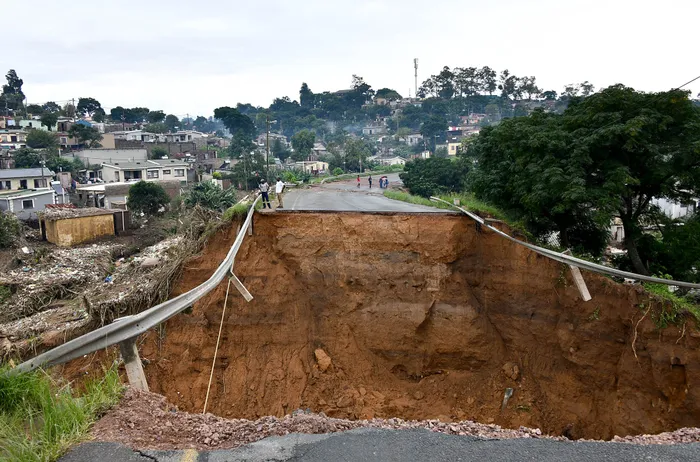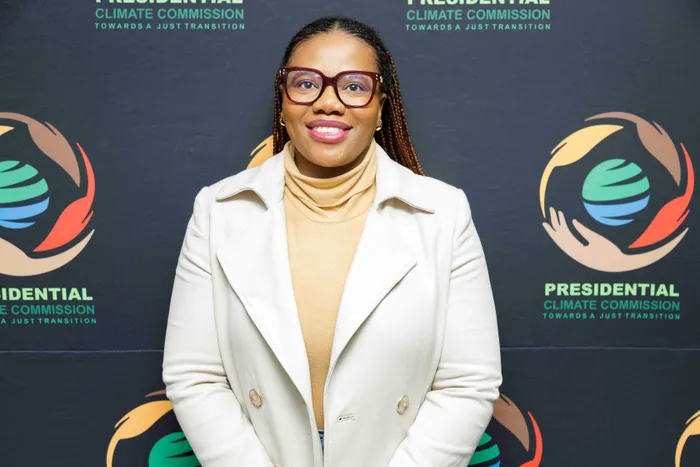Water and climate nexus: South Africa’s imperative for resilience

The aftermath of heavy rains and flooding in parts of KwaZulu-Natal in this file photo.
Image: Kopano Tlape
South Africa is a water-scarce country, facing profound water security challenges that are now being compounded by climate change. South Africa’s climate story is in many ways is a water story. Droughts and floods arrive in the same breath, shifting from one extreme to the next with devastating consequences. As climate impacts intensify, water emerges not merely as a casualty but as a catalyst shaping emissions, resilience, and social justice. If South Africa fails to integrate water into its climate response, it risks compounding crises of scarcity, inequity, and fragility.
The Climate Crisis as a Water Crisis
At its core, South Africa’s climate crisis is a water crisis. Floods, droughts, and crumbling infrastructure are no longer distant risks they are lived realities. The 2015–2018 Cape Town drought, culminating in the looming Day Zero, revealed how quickly urban centres can edge toward collapse and how collective conservation can avert disaster. In April 2022, KwaZulu-Natal experienced devastating floods in Durban and surrounding areas, displacing thousands, causing widespread destruction, and highlighting the deadly consequences of extreme rainfall events in densely populated regions. More recently, in June 2025, torrential rains triggered catastrophic flooding in Mthatha, Eastern Cape, killing over 100 people.
These events are not isolated anomalies; they are symptoms of a deeper, structural crisis. Studies estimate that by 2030, South Africa could face a 17% national water shortfall, driven by rising demand, aging and failing infrastructure, and chronic underinvestment. Compounding this scarcity is a quieter, insidious threat: collapsing water quality. Sewage pollution, acid mine drainage, and industrial effluent choke rivers and wetlands. During droughts, pollutants concentrate; during floods, they spread into homes, farms, and water supply systems, fuelling disease, eroding ecosystems, and deepening the vulnerability of poorer communities.
Water also occupies a paradoxical role in the climate crisis. Shifts in rainfall patterns fuel droughts and flash floods, while degraded water systems contribute to greenhouse gas emissions and undermine carbon storage in wetlands and aquifers. Recognising this duality is not an academic exercise it is essential to effective climate action. Water is not merely a sector to be managed; it is the very stage on which climate risks and opportunities unfold.
A Global Call to Action
Globally, water is gaining recognition as central to climate action. This year’s World Water Week 2025 in Stockholm, themed “Water for Climate Action”, took place at the end of August, underscores that resilience will fail without water-sensitive solutions. For South Africa, this is more than symbolism it is an invitation to lead. The country’s hard-won lessons, from managing drought to confronting flood disasters, can help shape a justice-oriented climate agenda that prioritises water security.
Yet, South Africa’s own climate and water policies remain largely disconnected. Climate change is often treated as an energy or emissions issue, while water is siloed as a service delivery concern. This fragmentation undermines the country’s ability to manage water-related climate risks in a coherent, forward-looking way.
Pathways for Transformation
If water is the lens through which climate risks are most visible, it must also be the lens through which solutions are designed. South Africa’s pathway forward requires a comprehensive paradigm shift across planning, infrastructure, finance, and community engagement.
Water must be elevated beyond service delivery into the core of climate planning. Every resilience strategy whether in agriculture, urban development, or energy depends on water security. Flood defences, aquifer recharge, drought planning, and catchment-based management should be recognised as climate strategies, not sectoral afterthoughts. Integrated Water Resource Management (IWRM), rainwater harvesting, and groundwater recharge are practical tools that both secure water availability and reduce energy-intensive water supply demands, creating dual benefits for mitigation and adaptation.
Global negotiations, such as COP, often prioritise energy transitions while sidelining water. South Africa should leverage its diplomatic influence to champion water-centric adaptation, financing, and restoration.
Fragile infrastructure is the Achilles heel of South Africa’s water sector. Fixing leaks, modernising pumping stations, and building redundancy into distribution systems may lack political glamour, but they are essential. Decentralized wastewater treatment, greywater recycling, and flood-resilient urban drainage not only safeguard water access but also improve energy efficiency and reduce emissions. Nature-based solutions including wetland restoration, riparian buffer zones, forest and watershed management, and coastal mangrove restoration provide cost-effective buffers against droughts and floods while sequestering carbon and supporting biodiversity.
South Africa cannot continue patching infrastructure with shrinking public budgets. Blended financing models combining public investment, private capital, and international climate funds are crucial. Aligning national priorities with climate finance mechanisms can unlock the resources needed for adaptation, infrastructure resilience, and ecosystem restoration.
Citizens can be active agents of resilience when engaged transparently. Community-led water monitoring, youth-driven watershed stewardship, and local conservation initiatives are indispensable. Public trust hinges on transparency and accountability; without people, equity and resilience are impossible.
The impacts of climate change are already visible through empty dams, floods, and collapsing water systems. But within this crisis lies opportunity to reposition water not as a constraint, but as a lever for resilience, justice, and sustainable development. Platforms such as World Water Week and COP negotiations provide South Africa with the chance to champion a new water–climate compact. One that embeds resilience in planning, repairs infrastructure before it fails, empowers local communities, and ensures adaptation finance flows to those who need it most.

Dr Notiswa Libala is the Komati Just Transition Manager at the Presidential Climate Commission.
Image: Supplied
Dr Notiswa Libala is the Komati Just Transition Manager at the Presidential Climate Commission.
*** The views expressed here do not necessarily represent those of Independent Media or IOL.
BUSINESS REPORT